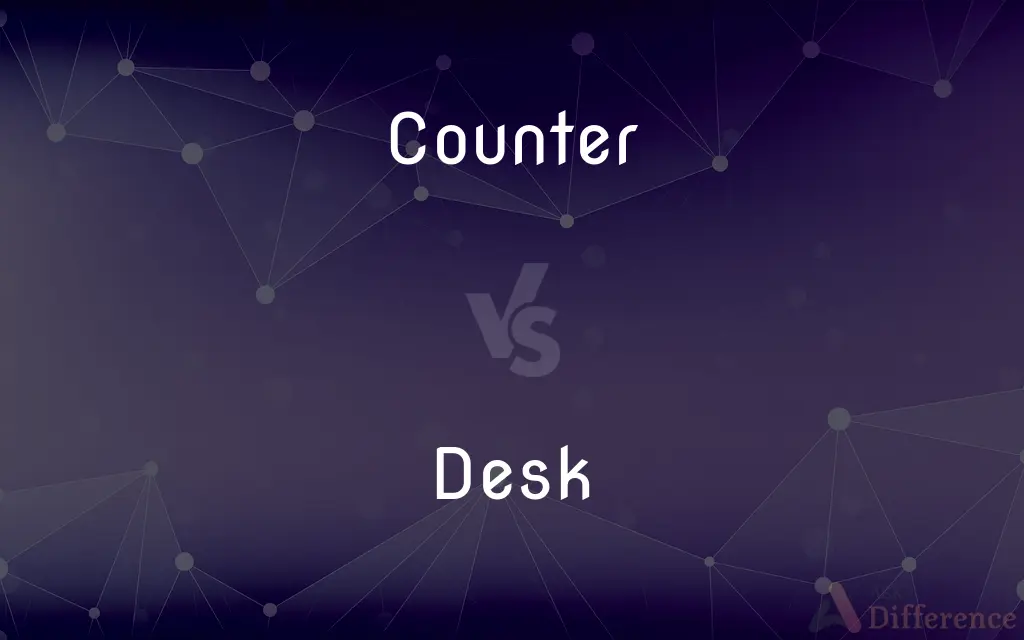Counter vs. Desk — What's the Difference?
By Tayyaba Rehman & Maham Liaqat — Updated on April 24, 2024
A counter is a flat surface used for transactions or displays, often found in retail or kitchen settings, whereas a desk is a piece of furniture specifically designed for reading, writing, or working, typically in an office or home environment.

Difference Between Counter and Desk
Table of Contents
ADVERTISEMENT
Key Differences
A counter is primarily used in commercial settings such as stores, cafes, and kitchens, serving as a workspace or point of sale. Whereas desks are most commonly used in personal or office spaces, designed to accommodate activities like writing, using a computer, and organizing documents.
Counters are often built to withstand heavy use and frequent cleaning, making materials like stainless steel and stone popular choices. On the other hand, desks may feature a variety of materials including wood, metal, and glass, chosen for aesthetics as well as functionality, reflecting their use in less abrasive environments.
The design of a counter often includes features like a high base for standing usage or tall stools, with accessibility for both staff and customers in mind. Desks, however, are typically designed for seated use, often equipped with drawers and compartments for storage.
Ergonomically, counters are positioned at a height suitable for standing or sitting on high stools, facilitating quick tasks or transactions. Desks are usually lower, tailored to the height of an office chair, aimed at comfort during longer periods of work.
In terms of customization, counters may be designed to fit the specific needs of a business, such as bars, reception areas, or cooking spaces. Desks, while also customizable, often focus on personalization for the user's comfort and productivity, with options like adjustable heights and built-in cable management.
ADVERTISEMENT
Comparison Chart
Primary Use
Transactions, service, or display
Reading, writing, working
Common Settings
Retail stores, kitchens, reception areas
Offices, home studies
Material Choices
Stainless steel, stone, laminates
Wood, metal, glass
Design Features
High base for standing, open for accessibility
Lower height, drawers, and compartments
Ergonomic Design
Suitable for standing or high stools
Designed for seated use with an office chair
Compare with Definitions
Counter
A flat surface for business transactions or food preparation.
The marble counter in the bakery is both stylish and durable.
Desk
Typically positioned at a height comfortable for seated work.
The desk is matched with an ergonomic chair to enhance comfort during long work hours.
Counter
Often designed with a high base for standing usage.
The counter at the coffee shop allows for easy access for both staff and customers.
Desk
A piece of furniture used for office work, reading, or writing.
Her wooden desk is equipped with drawers for all her office supplies.
Counter
Found in commercial settings like stores and kitchens.
Stainless steel counters are preferred in restaurant kitchens for their hygiene and durability.
Desk
Common in personal and professional office spaces.
Each cubicle in the office is equipped with a spacious desk.
Counter
May include storage or display features underneath.
The retail counter has shelving beneath it for storing merchandise.
Desk
May feature compartments for organizational purposes.
His desk includes compartments for files and a dedicated space for his laptop.
Counter
Designed for quick access and easy cleaning.
The smooth surface of the counter makes it easy to wipe down after each customer.
Desk
Often customizable for personal comfort and productivity.
The adjustable height desk allows him to alternate between sitting and standing.
Counter
A flat surface on which money is counted, business is transacted, or food is prepared or served.
Desk
A desk or bureau is a piece of furniture with a flat table-style work surface used in a school, office, home or the like for academic, professional or domestic activities such as reading, writing, or using equipment such as a computer. Desks often have one or more drawers, compartments, or pigeonholes to store items such as office supplies and papers.
Counter
(Games)A piece, as of wood or ivory, used for keeping a count or a place.
Desk
A piece of furniture typically having a flat top for writing, reading, or using a computer, and often drawers or compartments.
Counter
An imitation coin; a token.
Desk
A table, counter, or booth at which specified services or functions are performed
An information desk.
A reception desk.
Counter
A piece of money.
Desk
A department of a large organization in charge of a specified operation
A newspaper's city desk.
Counter
One who counts.
He's only 16 months, but is already a good counter – he can count to 100.
Desk
A lectern.
Counter
A reckoner; someone who collects data by counting; an enumerator.
Desk
A music stand in an orchestra.
Counter
An object (now especially a small disc) used in counting or keeping count, or as a marker in games, etc.
He rolled a six on the dice, so moved his counter forward six spaces.
Desk
A table, frame, or case, in past centuries usually with a sloping top but now usually with a flat top, for the use of writers and readers. It often has a drawer or repository underneath.
Counter
A telltale; a contrivance attached to an engine, printing press, or other machine, for the purpose of counting the revolutions or the pulsations.
Desk
A reading table or lectern to support the book from which the liturgical service is read, differing from the pulpit from which the sermon is preached; also (especially in the United States), a pulpit. Hence, used symbolically for the clerical profession.
Counter
(programming) A variable, memory location, etc. whose contents are incremented to keep a count.
Desk
A department tasked with a particular topic or focus in certain types of businesses, such as newspapers and financial trading firms.
The city desk, the sports desk
The options desk, the equities desk
Counter
(Internet) A hit counter.
Desk
A station for a string player in an orchestra, consisting of a chair and a music stand, or a row of such stations.
Counter
A table or board on which money is counted and over which business is transacted
He put his money on the counter, and the shopkeeper put it in the till.
Desk
(transitive) To shut up, as in a desk; to treasure. en
Counter
A shop tabletop on which goods are examined, weighed or measured.
Desk
(transitive) To equip with a desk or desks.
Counter
In a kitchen, a surface, often built into the wall and above a cabinet, designed to be used for food preparation.
Desk
A table, frame, or case, usually with sloping top, but often with flat top, for the use writers and readers. It often has a drawer or repository underneath.
Counter
In a bathroom, a surface, often built into the wall and above a cabinet, which holds the washbasin.
Desk
A reading table or lectern to support the book from which the liturgical service is read, differing from the pulpit from which the sermon is preached; also (esp. in the United States), a pulpit. Hence, used symbolically for "the clerical profession."
Counter
(curling) Any stone lying closer to the center than any of the opponent's stones.
Desk
To shut up, as in a desk; to treasure.
Counter
(historical) The prison attached to a city court; a compter.
Desk
A piece of furniture with a writing surface and usually drawers or other compartments
Counter
(grammar) A class of word used along with numbers to count objects and events, typically mass nouns. Although rare and optional in English (e.g. "20 head of cattle"), they are numerous and required in Chinese, Japanese, and Korean.
Counter
Something opposite or contrary to something else.
Counter
(martial arts) A proactive defensive hold or move in reaction to a hold or move by one's opponent.
Always know a counter to any hold you try against your opponent.
Counter
(nautical) The overhanging stern of a vessel above the waterline, below and somewhat forward of the stern proper.
Counter
The piece of a shoe or a boot around the heel of the foot (above the heel of the shoe/boot).
Counter
(music) contra Formerly used to designate any under part which served for contrast to a principal part, but now used as equivalent to countertenor.
Counter
The breast of a horse; that part of a horse between the shoulders and under the neck.
Counter
(typography) The enclosed or partly closed negative space of a glyph.
Counter
(obsolete) An encounter.
Counter
Contrary, in opposition; in an opposite direction.
Counter
In the wrong way; contrary to the right course.
A hound that runs counter
Counter
To contradict, oppose.
Counter
(boxing) To return a blow while receiving one, as in boxing.
Counter
To take action in response to; to respond.
Counter
To encounter.
Counter
Contrary or opposing
His carrying a knife was counter to my plan.
Counter
One who counts, or reckons up; a calculator; a reckoner.
Counter
A piece of metal, ivory, wood, or bone, used in reckoning, in keeping account of games, etc.
The old gods of our own race whose names . . . serve as counters reckon the days of the week.
What comes the wool to? . . . I can not do it without counters.
Counter
Money; coin; - used in contempt.
To lock such rascal counters from his friends.
Counter
A prison; either of two prisons formerly in London.
Anne Aysavugh . . . imprisoned in the Counter.
Counter
A telltale; a contrivance attached to an engine, printing press, or other machine, for the purpose of counting the revolutions or the pulsations.
Counter
A table or board on which money is counted and over which business is transacted; a long, narrow table or bench, on which goods are laid for examination by purchasers, or on which they are weighed or measured.
Counter
The after part of a vessel's body, from the water line to the stern, - below and somewhat forward of the stern proper.
Counter
Same as Contra. Formerly used to designate any under part which served for contrast to a principal part, but now used as equivalent to counter tenor.
Counter
The breast, or that part of a horse between the shoulders and under the neck.
Counter
The back leather or heel part of a boot.
Counter
An encounter.
With kindly counter under mimic shade.
Counter
Contrary; in opposition; in an opposite direction; contrariwise; - used chiefly with run or go.
Running counter to all the rules of virtue.
Counter
In the wrong way; contrary to the right course; as, a hound that runs counter.
This is counter, you false Danish dogs!
Counter
At or against the front or face.
Which [darts] they never throw counter, but at the back of the flier.
Counter
Contrary; opposite; contrasted; opposed; adverse; antagonistic; as, a counter current; a counter revolution; a counter poison; a counter agent; counter fugue.
Counter
To return a blow while receiving one, as in boxing.
His left hand countered provokingly.
Counter
Table consisting of a horizontal surface over which business is transacted
Counter
Game equipment used in various card or board games
Counter
A calculator that keeps a record of the number of times something happens
Counter
A piece of furniture that stands at the side of a dining room; has shelves and drawers
Counter
A person who counts things
Counter
A quick reply to a question or remark (especially a witty or critical one);
It brought a sharp rejoinder from the teacher
Counter
(computer science) a register whose contents go through a regular series of states (usually states indicating consecutive integers)
Counter
The piece of leather that fits the heel
Counter
A piece of leather forming the back of a shoe
Counter
A return punch (especially by a boxer)
Counter
Speak in response;
He countered with some very persuasive arguments
Counter
Act in advance of; deal with ahead of time
Counter
Indicating opposition or resistance
Counter
In the opposite direction;
Run counter
Common Curiosities
Where would you typically find a counter?
Counters are common in retail environments, kitchens, and reception areas.
Can a counter be used as a desk?
While not designed for the same purpose, a counter can be adapted for temporary desk tasks, though it may not be as comfortable for prolonged use.
What ergonomic considerations are there for desks?
Desks are designed to be used with office chairs, with heights that support good posture and reduce strain during long periods of sitting.
How do material choices for counters and desks reflect their use?
Material choices for counters focus on durability and ease of cleaning, important for high-traffic areas, while desk materials might prioritize aesthetics and comfort.
Is there a difference in maintenance between counters and desks?
Yes, counters generally require more frequent and rigorous cleaning due to their use in public and food-related settings, whereas desks might need less frequent upkeep.
Why might a desk feature drawers while a counter might not?
Desks often feature drawers to organize documents and supplies for office work, while counters may prioritize open space underneath for accessibility.
What are common materials used for desks?
Desks are commonly made from materials like wood, metal, and glass, chosen for durability and aesthetics.
How do personalization options for desks enhance functionality?
Personalization such as adjustable heights and preferred material choices make desks adaptable to individual needs, enhancing functionality and comfort.
What is a counter?
A counter is a flat surface used in various settings for service, transactions, or display.
How does a desk differ from a counter?
A desk is specifically designed for tasks like reading and writing, often featuring storage solutions, whereas a counter is more for quick, stand-up tasks or transactions.
Can the design of a desk impact productivity?
Yes, a well-designed desk with features like ergonomic height and organized storage can significantly enhance productivity and comfort.
What makes a counter suitable for commercial settings?
Durability, ease of cleaning, and a design conducive to quick transactions or displays make counters ideal for commercial settings.
Are counters designed for customer interaction?
Yes, many counters are designed specifically to facilitate customer interaction, often found in service and sales environments.
What design features distinguish desks in an office environment?
Desks in an office might include features like cable management systems, adjustable components, and extensive storage options.
How can a counter be ergonomically designed for comfort?
Though primarily standing stations, counters can be designed with ergonomic considerations like suitable heights and foot rests to alleviate strain during long periods of standing.
Share Your Discovery

Previous Comparison
Cuke vs. Cucumber
Next Comparison
Absolutely vs. CompletelyAuthor Spotlight
Written by
Tayyaba RehmanTayyaba Rehman is a distinguished writer, currently serving as a primary contributor to askdifference.com. As a researcher in semantics and etymology, Tayyaba's passion for the complexity of languages and their distinctions has found a perfect home on the platform. Tayyaba delves into the intricacies of language, distinguishing between commonly confused words and phrases, thereby providing clarity for readers worldwide.
Co-written by
Maham Liaqat















































